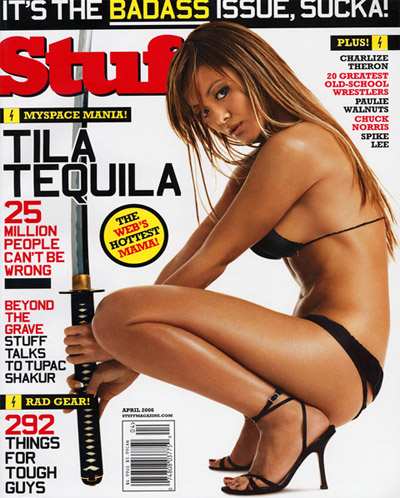|
|
 |
|
Image
source: Stuff
Magazine
|
(It is worth noting that before and after writing this article, this writer has never read the book, "The Brand Gap" by Marty Neumeier, which apparently uses the term "charismatic brand" which we use here also. Total coincidence, really. This writer also cannot confirm if any of the attendees to our forum read the book. Based solely on reviews this writer checked online, there are genuinely new ideas on the charismatic brand presented here. But that isn't guaranteed.)
What is Charisma?
What American Heritage Dictionary on Answers.com says of charisma:
A rare personal quality attributed to leaders who arouse fervent popular devotion and enthusiasm; personal magnetism or charm.
What we say:
The perception that a person, place, or thing has a mystique that an overexposed, monotonously zapped, natural human curiosity thirsts to explore for no other reason than that mystique possesses enough of a notable difference to commit at least some time to exploring.
Charisma is believed to be innate within the individual or thing, but it can be manufactured by any good marketer and more importantly, utilized repeatedly without fail as long as the manufacturer of this charisma understands that they must either a) expect their audience's enthusiasm in its charisma to fade or b) keep refreshing the cause of the charisma.
As American Heritage defines it, charisma is rare; supposedly, not everyone has it. Then again, consider how anyone, from Daryl Littlejohn to nearly every actor can assume different identities in order to create and control their "brand's" charisma. The internet has certainly made everyone a schizophrenic.
Furthermore, the timeframe during which an individual drawn to the charismatic brand is limited, not the charisma of the brand. Thus, a fan today may not be a fan tomorrow. But the charismatic brand will always have fans as long as it maintains its charisma.
What does it say of charisma if only famous brands have it and all famous brands do is entertain? Fame is not achieved entirely by being a source of entertainment. That which a famous brand does, recall, is different from the rest of society, becoming a distraction from the everyday, and thus, rendering the famous brand the center of attention. It engages in the activity as a form of expressing its charisma, but isn't always for the benefit of amusing the masses. Thus celebrity as a profession, in the words of my good friend and great aspiring actress Alethea, is the most selfish profession in the world.
Is Your Brand a Selfish, Manipulative Dictator?
Charismatic brands are introduced and perpetuated via word of mouth and the relationship between the brand and its audience is reinforced by frequency and reach via traditional media channels.
Defining marketing as a method by which brands have relationships with their audiences and media as the channel through which that relationship is initiated, cultivated, and maintained, and word-of-mouth as an uncontrollable medium, how then can a brand effectively exploit its charisma in order to control its relationship with its fans, who are mostly introduced to the brand's charisma via word-of-mouth?
It is charisma that hooks the fan into the relationship. Thus, the charismatic brand must also direct the means by which its fans introduce others to their favorite brands, be it via a fan's own form of a mass medium or a one-to-one dialogue with the people in their social networks. (Hence the "share with friends" feature on nearly every piece of content online today.)
Could one argue that without an intermediary relationship a consumer could still be prompted to interact with a charismatic brand? No, unless the consumer stumbled across the brand accidentally.
The amount of time a fan commits to this relationship means that fan has to let alone any other activity that demands their attention. Thus, not only is a charismatic brand selfish, it commands tribute of that most precious resource - our time. And it does it all intentionally, with purpose, so a fan forgets anything else they were previously engaged with and finds it hard imagining doing anything else. In fact, it takes a major life occurrence - i.e. finding a new love, a tragedy, or significant upheaval - to prevent that fan from committing time to their relationship with that charismatic brand.
In Preparation for When the Media Establishment's Entire Business Model Will Change
What does this mean to the media establishment if any charismatic Tom, Dick, and Samberg can record themselves talking trash (or throwing it), put it online on their own personal blog, get it linked to a thousand other blogs, which get picked up by search engines, and they start selling some space at $100k-a-pop because their audience for that nugget of content reaches 4 million people in a week, all done entirely bypassing the establishment altogether?
And what would happen if Samberg and his buddies knew how to duplicate this effort consistently and perhaps coincidentally, all had Ivy League business degrees? Understanding charisma and how to be a charismatic brand can theoretically remove the impact of subjectivity from the creative product evaluation, assuring any marketer can assemble an audience immediately on demand, without the investments typical of compiling and promoting content.
In other words, charisma
can change the entire business model of the media establishment, from the way
content gets made to the way it gets distributed to the way we can make money
from it. And it's happening now. Are you prepared?
|
|